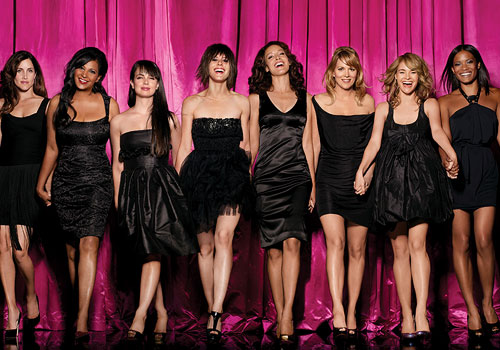The L Word and “But Not Too Bi”: Flipping The Script Is Not Much Better
It’s been ten years since The L Word premiered, and we’ve got lots to talk about. Welcome to The L Word week!
Bisexuality, and the way it is presented in both queer and “straight” media, is always a complicated issue. The degree to which we are welcomed in the LGBTQ community, how that varies between different sections of it, how that should vary… that is a question that can be debated endlessly. What is harder to dispute is that, as far as media representation goes, bisexual “stereotypes” tend to fall into a few distinct patterns.
TV Tropes, the user-created wiki cataloguing different character, plot and other “patterns” in fiction, has a few different examples of common “bisexuality tropes.” From the violent or insane “Depraved Bisexual” to “Anything That Moves,” the character whose lack of preference with gender extends to a lack of preference in anything, it is obvious what is wrong with a lot of these “tropes.” Suggesting that a non-heterosexual orientation leads to mental instability, or that bisexual people cannot be monogamous or choosy, is playing into well-known and harmful stereotypes. Yet the problems with others are somewhat less obvious; this is the case with “But Not Too Bi.”
The site defines the “But Not Too Bi” trope as the following: “A character is nominally bisexual but is almost exclusively involved with one sex during the run of the narrative.” It goes on to list some of the common ways in which this plays out:
1. Time: Alice used to date or sleep with both sexes, but there is no indication that she does so now.
2. Actions on screen: Bob sleeps with both sexes, but the only relationships he forms are with women…
3. Tone/emotion: These two usually go together. If Alice considers her experiences with women to be wacky hijinks and her experiences with men to be love stories, they are usually treated as such by the music, the other characters and the rest of the set.
The first two, of course, are not “problematic” on their own; there are real-life people who identify as bisexual while later coming to realize that they are exclusively gay or straight, or even just bi people who end up in long-term monogamous relationships with someone of a particular gender. Likewise, there are people who are sexually interested in more than one gender, but only romantically interested in one, or vice versa: “homoromantic bisexuals” and so on. Yet, the issue of a “pattern,” once again, comes up. What does it say to the viewers when so many of the bi characters we see are like this – viewers who may not be open to the nuances of romantic vs. sexual attraction? The third example gives a clue: that one kind of attraction is more significant than another, and in turn, that bi people are kidding themselves when they pretend that they can have both. As it also writes:
“[The] key is to create some form of pecking order between the sexes, presumably in order to make the character more appealing to the audience depending on what gender and sexuality they are expected to have, while at the same time having the titillation, comedic material or diversity of ‘deviant’ sexual behavior. Of course, the prevalence of the trope brings some unfortunate implications for real life bisexuals; that in the end it’s only one gender that matters to them and that their experiences with the other one are worthless.”
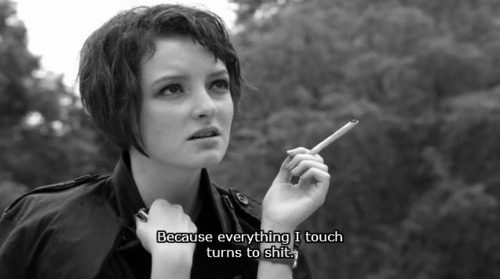
A good description of how the Skins writers dealt with their bi and pan characters
The way the trope most often plays out in media is where a bisexual character’s “real” relationships or “focus” is toward the opposite sex. This is where the “deviant” part comes in, and the issue of “diversity”: it can seem like writers want to have their cake and eat it, too, gain credibility for having an LGBTQ character on their screen while not alienating certain bigoted straight viewers by showing them in an actual same-sex relationship. In this sense, the “But Not Too Bi” trope hurts both gay and bi people: it furthers stereotypes about bi people “kidding themselves” and defines non-heterosexuality in general as The Other, something that is “too much” to portray fully on-screen.
For all the credit it gets for its portrayal of lesbian couple Naomi and Emily in the third and fourth seasons, Skins engaged in this in the other two generations’ casts with its bi and pansexual characters. In the first generation, Tony and Cassie had dalliances with both boys and girls, but their “real” relationships were with opposite-sex characters. How the third generation dealt with Franky was even more egregious, as after she told everyone in the fifth season that her sexual orientation was “into people” – which sounds like she’s bisexual and/or pansexual – she was never shown to have a sexual or romantic encounter with anyone other than a boy. In the end, even though these characters had interest in multiple genders, the “double standard” causes fans of the show to debate their sexual orientations, finding reasons to explain any same-sex interest as “not counting.” Similar to the issue with queerbaiting, it draws in queer viewers while still upholding the double standard that reminds us that we’re inferior.
The L Word, of course, is a different story. While “But Not Too Bi” was firmly in effect with the main characters who could be read that way – Alice Pieszecki, Jenny Schechter and Tina Kennard – their bias was toward the same gender, rather than the opposite one. When the “double standard” is toward a disadvantaged rather than privileged group, does the problem change? Is there even a problem?
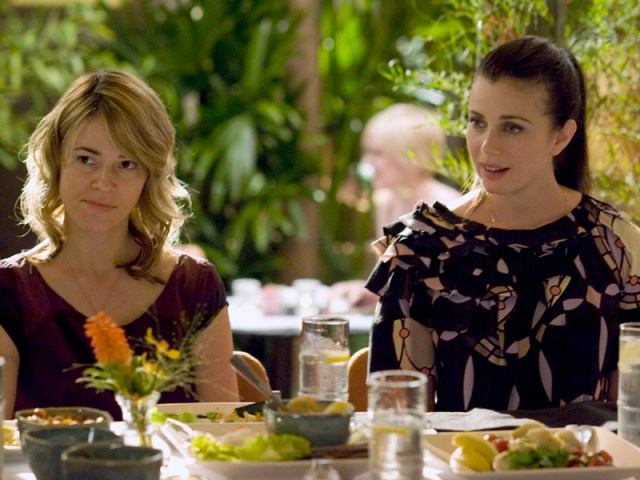
Alice Pieszecki starts out from the very first episode, proudly identifying herself as bisexual and rebuking her friends’ biphobia. When Dana asks her, “When are you going to make up your mind between dick and pussy?” Alice responds with, “Well, for your information, Dana, I am looking for the same qualities in a man as I am in a woman.” She dates Lisa, a “lesbian-identified man,” during the first season. However, as the seasons go on, Alice later comes to identify as a lesbian, even testifying under oath as such. In the third season, she jokes by Dana’s bedside, “You’re right. Bisexuality is gross. I see it now.” The joke was in response to Tina’s question about how she’s dressed for a date with boyfriend Henry. Tina herself plays into another bisexual stereotype – the bisexual cheater, who leaves her long-term lesbian partner for a man – but it says something that Alice is now attacking other bi women with the same kind of biphobia she despised in the first season.
Whether the dramatic and troubled Jenny would count as good bisexual representation anyway is another matter, since “crazy bisexuals” are their own minefield of a media trope. Regardless, despite her starting off the show engaged to a man, and having her interest in women referred to as “bisexual” (as in the joke in the pilot about finger lengths), Jenny later in the show comes to identify as a lesbian. She is so lesbian-identified, in fact, that she comes to exclude Tina for choosing to date a man, insisting she is “enjoying all the heterosexual privileges” when she walks around with him. It makes sense that Jenny would mostly date women after coming out as bisexual (a term she does use to define herself in the first season) and leaving her fiancé Tim, since she’s likely “making up for lost time;” Jenny probably only dated men before she came to terms with her sexuality over the course of the first season. However, even with that understanding in place, the show still manages to find a way to eventually twist Jenny’s character into one that undermines bisexuality. Her interest in men is something of the past, and something she actively disavows in her current identity. It is “lesser.”
While Tina does at least get to have ongoing, significant relationships with characters of multiple genders, she, too, continues to identify as a lesbian and eventually comes to disavow her interest in men when she gets back with Bette later in the show. Bisexuality on The L Word is a transitional state and, like the Skins examples but in reverse, bi women’s interest in men is always secondary and never lasts. They always, inevitably, move toward a lesbian identity.
It’s interesting to wonder if these examples would be a problem in isolation. Certainly, it is an issue when one of the most visible and influential queer shows on TV makes a pattern of showing bisexual characters as fake or duplicitous; it raises the question of if they would have represented bi people better by leaving us out entirely, as another highly visible and influential queer show – the US version of Queer as Folk – arguably did. Yet, would these characters be a problem if there were other, contrasting examples of bisexuality on the show? As mentioned before, Jenny’s lack of male partners after, presumably, a lifetime of only dating men makes sense, if not her animosity toward other bi women later in the show. Alice could easily be a lesbian who slowly came to her true sexual identity after believing she was bisexual; this is also realistic. And Tina’s cheating on Bette – a relationship that was on the fritz anyway – isn’t necessarily a problem absent a cultural stereotype of bi people as cheaters. People of all sexual orientations cheat, after all. Certainly, none of these situations are necessarily unrealistic. So is it merely a lack of diversity in experiences, or are they problematic on their own?
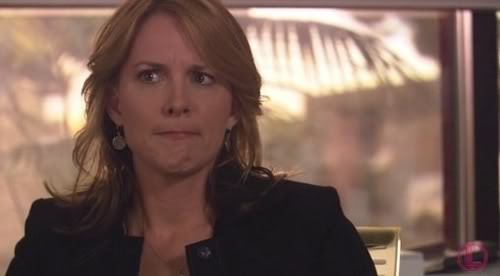
I feel the same way, Tina
When one looks closer at The L Word‘s failings when it comes to bisexual representation, it isn’t just about a lack of variety. In fact, all The L Word‘s bi characters have different experiences with their attraction to people of multiple genders, but all happen to gravitate more toward women – which makes sense for a lesbian-focused show. It does have variety. The problem is that every single one is presented in a way that makes bisexuality as a whole seem like a negative thing. It undermines bisexual people and identities in general.
There are ways The L Word could have given us these storylines without making bisexuality, or bisexual women, look bad. A close friend of mine identified as bi before he later came out as gay, but still makes it clear to others that bisexuality is real, just not who he is. If Alice is truly a case of a lesbian character who was previously bi-identified – and not just a case of the writers changing their minds halfway through – they could have presented that identity crisis like my friend’s, making it clear it wasn’t her identity but still a valid identity in general. Or just not had her comment on it at all, beyond stating that it’s no longer how she identifies. That’s not great when it’s the only representation we get, but it’s fine when there are other bi women in the cast, and certainly very realistic.
Jenny could have continued to identify as bisexual or something else that suggests an interest in multiple genders, since she clearly is attracted to both men and women over the course of the show. If not, there could have been a conversation about why the “lesbian” label was more comfortable for her: feeling more in tune with the lesbian community as a whole? A reaction to biphobia? Or, at the very least, as with Alice, we did not need to see her attacking other women who are interested in people of multiple genders, actively excluding them from her queer communities.
If even one of these had happened, The L Word could be counted as having some actually good bisexual representation. The biphobic attitudes of any other characters would have come off the way Dana’s had earlier in the series: that character‘s attitude, not that of the show. But because The L Word instead made a pattern of having even its actual bi characters come to embrace biphobia, that’s not what happened. It appears that the show itself wants to undermine bi women, or at least make it clear we’re not welcome in queer communities. So in that sense, part of the problem is a flipped version of “But Not Too Bi” – which, while not as heterosexist as the usual straight-biased version, is still biphobic and monosexist. It still portrays bi people as Other and as duplicitous and confused. But it goes beyond that. The show outright states that these women aren’t queer enough unless they shed their bisexual identities.
I’ve always considered Reese Holloway, the main character in Malinda Lo’s sci-fi YA novel Adaptation, to be the ideal example of how to write bi characters well: she has a male and a female love interest and the narrative doesn’t appear to privilege one over the other. Yet, characters whose attractions are that close to the 50/50 mark aren’t necessarily “more realistic,” either. Even Kinsey 3 bi people don’t necessarily have their actual dating ratios down to that exact margin. Avoiding “But Not Too Bi” isn’t good representation in and of itself, since plenty of real-life people’s experiences can appear to uphold that trope. But at least don’t actively undermine bisexuality as a legitimate identity, and as one that belongs in the LGBTQ community (what else do you think that B stands for?)
There’s a good conversation to be had about what truly great and respectful bi representation looks like. But I think we can all agree that The L Word is not that.
In order to make sure that the comments section on this article is a healthy and welcoming place for our bisexual readers, please note that any comments that question the validity of bisexuality or sexual fluidity as a sexual orientation, question Autostraddle’s decision to publish pieces discussing bisexuality, or make essentialist claims about bisexual people (ex. bisexuals are cheaters, bisexuals turn out to be gay) will be swiftly deleted.
“Skins” Gets Axed, Just Like Franky
As Skins barrels through the endless bender of its sixth season, The Guardian is reporting that Channel 4 has confirmed that the controversial series will die (probably in a car crash) in 2013.
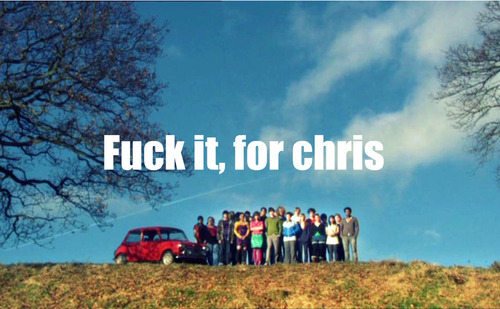
A Channel 4 spokesperson told The Guardian: “Skins is a brilliant show which has defined a generation and will go down as a truly iconic, game-changing piece of television but after seven series it is time for E4 to make way for the next generation of the bold, the new and the innovative.” Next year three more episodes will air, and the Channel 4 Rep says, “We think Skins has gone as far as we can take it, but we know fans will be disappointed. So we think three episodes to really celebrate the series is a good send-off.”
MSN reports that 2011 was a rough year for the franchise, saying that “the American version proved too controversial, and was axed after only a couple of episodes,” which isn’t actually true — MTV aired the complete season and then cancelled it, but the controversy if anything only amped up interest in the show. The American Skins‘ fatal flaw was that it totally sucked. Like it sucked so bad it needed a whole new word for “suck.”
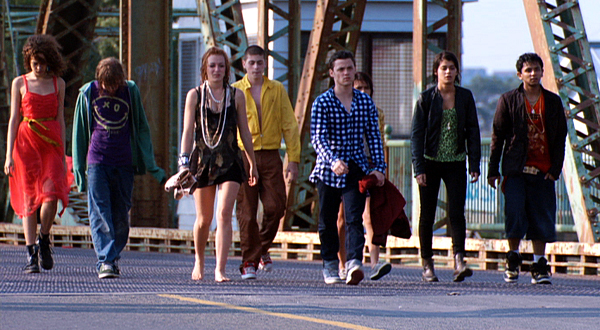
after drowning in suck, the cast of Skins US crosses a bridge
In the UK, Skins‘ ratings have been rolling gallantly downhill all season. MSN, apparently very short on fact-checkers yesterday, said that “last night’s finale” (It wasn’t the finale, it was only Episode seven of a 10-episode season) “was seen by just 630,000 people, a loss of over 40% of its launch audience.” They also report that Season Six debuted to the show’s lowest ever overnight average — a huge loss for a show that premiered in 2007 to 1.7 million viewers.
MSN theorizes: “Over five years in, and it seemed as if the writers were running short of the kind of fresh ideas that made the first couple of series so watchable. In this day and age, it’s perhaps difficult to appreciate just how groundbreaking Skins was when it first premiered. However, in its prime, it was a groundbreaking show for young people, devised by young people and played by young people.”
But is that really it? Now that the ground has been broken, we’re no longer moved by Skins‘ central concept? I don’t think so. There are definitely elements of the show’s premise less suited for a 2012 audience than a 2007 one, and I’ll get to those later, but perhaps MSN is the most accurate when they suggest “the new cast – including the likes of Dakota Blue Richards, Alex Arnold, Sean Teale, Freya Mavor and Jessica Sula – polarised fans. Some were enamoured with them, others weren’t.”
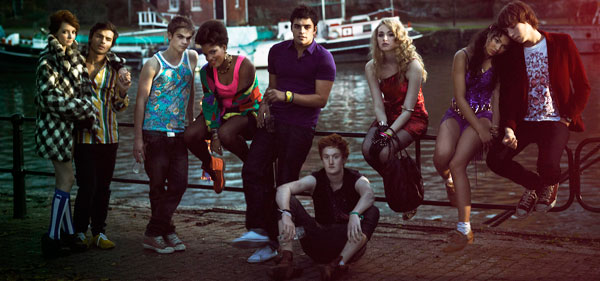
the cast of season six
Obviously the new cast never shone quite so dirty-bright as the previous two but Season Five had its moments — more specifically, it had Franky.

In Season Five, Skins unexpectedly found a way to break new ground with Franky; a delicately beautiful girl with nervous eyes, a wild angry vulnerability and a distinctly androgynous style. Although Franky never used the word herself, many viewers immediately identified her as “genderqueer,” which we don’t see on television, really, not ever. When asked whether she’s into girls or boys or both, Franky responds — with a rare assuredness for her — “I’m into people.”

Franky, who was bullied at her old school, is quickly harassed at her new one, too, but by Season Five’s end had meshed into a new gang and a new love triangle — or dodechahedron, really — dominated by Matty the Emo Brooder and Franky’s new best friend, the bitchy-because-she’s-needy Mini.
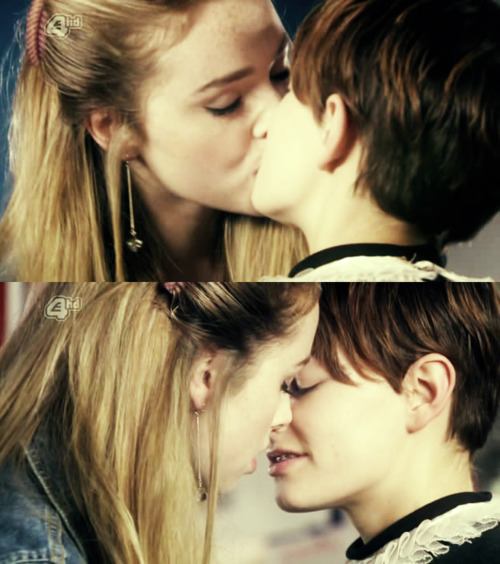
Minky share a romantic moment in season five
It was thrilling, that unexpected sexual tension with Mini, and it made perfect sense, it really did, that Mini’s initial twatdom towards Franky was rooted in internalized homophobia. Although I’m holding out hope that episode nine, “Mini & Franky,” will basically be the two of them on ecstasy in bed making collages in their underpants, thus far last year’s sexual tension has vanished into the ether along with Franky’s Oxfords.
Season Six debuts with the gang, clearly unfamiliar with photographs, telephones and TripAdvisor.com, vacationing in Morocco at a hotel situation that lacks beds, water, a functional pool, toilets or anything they’d allegedly paid for. When Franky and Matty, now officially together, pulled up in their Jeep, my eyeballs fell out of my face, mostly because I had no idea Dakota Blue Richards had such an impressive rack…
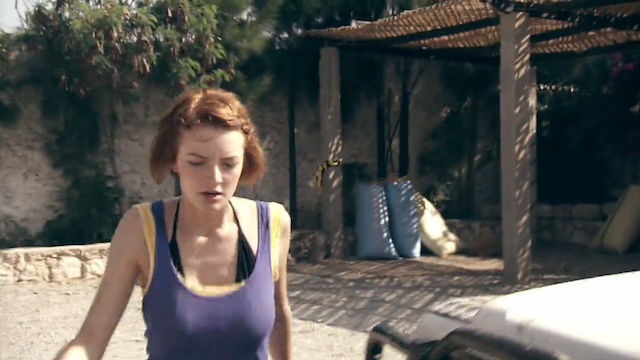
…but also because she didn’t look like Franky anymore.
S6’s stylist: “[This season] we’ll see [Franky] take control of who she is. Gone are the button up shirts, Franky has started to embrace her sexuality and she’s not afraid of exposing some flesh and finally being noticed by all.”
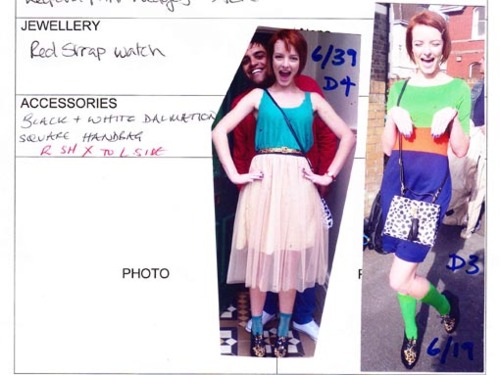
franky fashion, season six
This is how Franky’s style was described last year: “Her sartorial experiments defy all gender expectations and she’ll plunder from all ages of fashion if it feels right, from old-man trousers via romantic tail coats to Teddy Boy’s brothel creepers.”
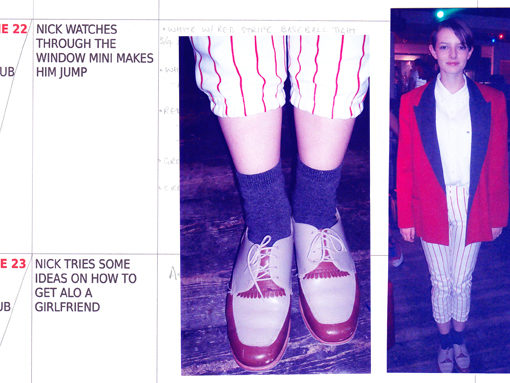
franky's fashion, season five
“I liked [Franky] better when she might or might not be lesbian.”
– Mini, Episode 601
Yeah, me too. How did we go from this…

To this?
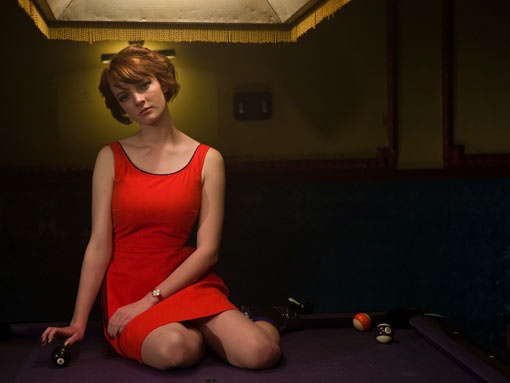
There’s nothing implausible about Franky’s turnaround, but it’s super-disappointing, and Skins‘ insistence that her new style reflects new confidence is both confusing and problematic. If S5’s Franky was confident about anything, it was probably her outfits. She wasn’t throwing shit on to cover herself up, she was a Dapper Fucking Q, that woman. She clearly had a passion for a certain kind of fashion.
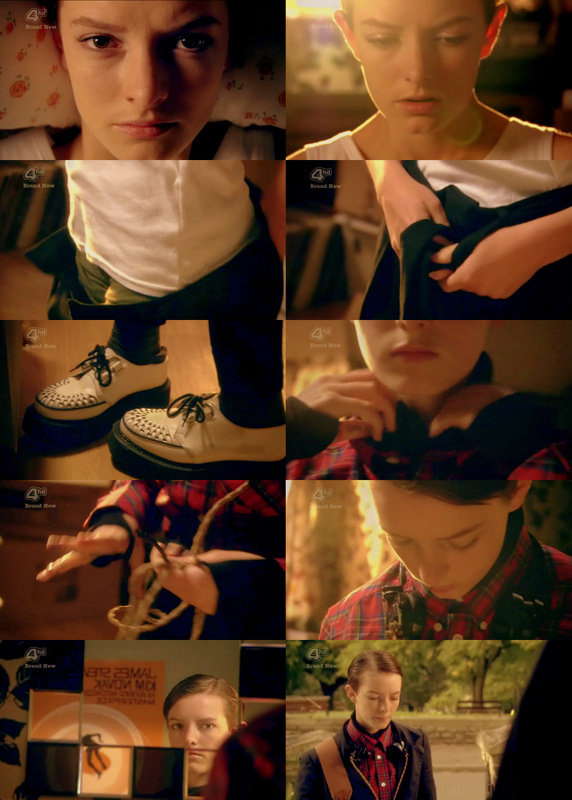
Franky getting dressed in Season Five
See, part of what made Franky so fun and revolutionary and compelling was that she disregarded the “femme = sexy” hierarchy and when peers suggested her style reflected insecurity/discomfort, Franky insisted otherwise — no, it was just her. When she felt peer-pressured into wearing makeup and a girly tank top to school in Season Five, she quickly broke down over it: “I tried today and now I feel kind of less like me, and I’m not exactly over the moon about being me in the first place, but now I think I kinda like it less when I’m trying NOT to be me. Because I just wanna like, be.”
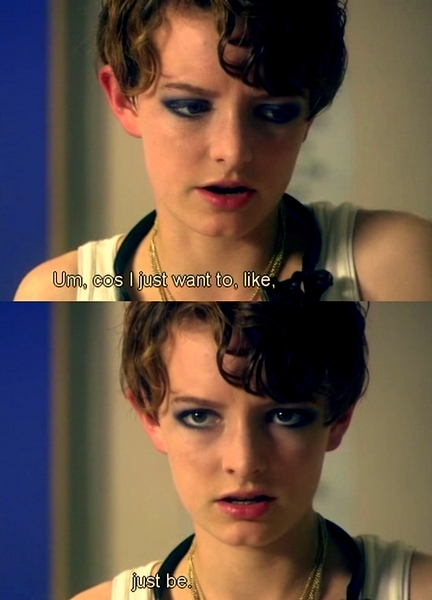
Season Five
We admired her deviance and weirdoness, which seems to be subsumed this season by a self-destructive streak that begins pre-Death-of-Grace, although its root is never truly fleshed out. Real talk: They’re trying to make Franky into Effy. Right? I mean, they’ve just sort of stuffed a bunch of Effy into Franky’s body and are running with it. Couldn’t they have picked someone else?
Also, as of Episode Seven, Franky’s already slept with three guys and has yet to fingerfuck Mini in a dirty city alley. So Franky joins the ranks of “female characters who are theoretically attracted to all genders but only actually date men in practice” which’s shitty for her queer-lady following and by that I mean ME.
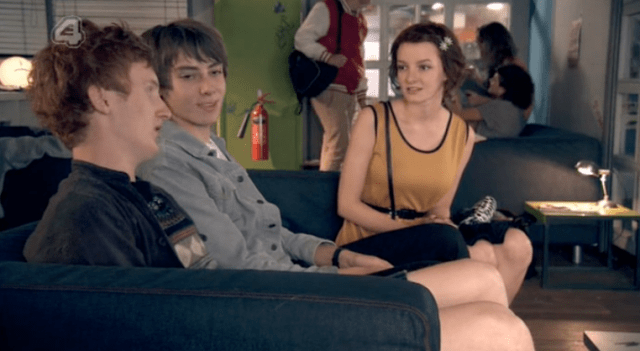
dude, stop looking at franky's rack!
Franky’s episode was probs the season’s best, although it was totally fucked and if I’d seen it as a teenager and if high-speed internet had existed when I was a teenager, I would’ve watched it ten times and had lots of confusing and ultimately self-destructive sexual feelings about it. But a part of me knows that’s not a good thing, and presenting all that physical violence between Franky and Luke without context — like when he aggressively fucked her while twisting and smashing her head into the bed with his hand completely covering her face — seemed sloppy and felt like shock for the sake of shock rather than a genuine desire to tell that particular story. Like the story about the girl named Franky from last season’s finale. .
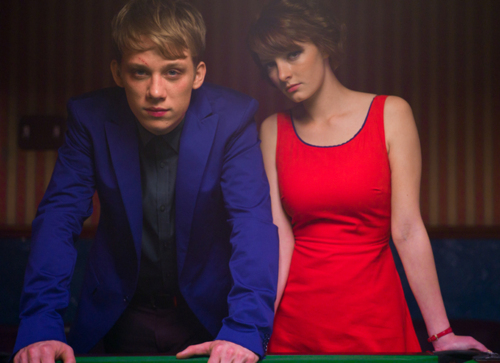
But it’s not just Franky who’s fallen out of favor this year, it’s everybody! Last season, Nick made me wanna take a nap and this year he makes me wanna smash a truck into a mountain of cocaine and slip into a seven-year coma. He’s suddenly in love with Franky now? Really Papi, Really? Fuck me in the ear.

I never fancied Alo or Rich but I appreciated the newness and distinctiveness of their characters, but this season I’d really like Alo to ride his tractor off a cliff. Their quirks have been muted in favor of repetitive storylines (Alo + Mini = Sid + Michelle = ~JJ + Emily) and pointless subplots like Grace LITERALLY DYING IN THE SECOND EPISODE and Alo hooking up with a 14-year-old named Poppy and getting arrested for it. That being said, Poppy is fucking awesome, get that girl a spin-off.

Poppy and Alo do drugs or something
But like everyone this season, selfishness abounds in fists for these boys, beyond anything the first two generations suggested. These rascals are slightly more unkind, less ambitious, more arbitrarily rebellious.
AND, despite Mini pinging so hard last season that she nearly fell into Franky’s vagina, this season that’s all over. In fact, she’s pregnant (like Jal!)!

this was cute though
Let’s be real here — fucking up isn’t new. Skins has made some epically stupid storylines over the years (for example: Sketch) and it’s probably just more apparent this season because the protagonists themselves haven’t captured us on their own merits.

There are some tropes replayed this season, like Skins’ most consistently irritating plot device of entangling its young comrades with unseemly gang members and drug dealers, situations which always lead to tense piles-of-cash-related confrontations in dark side-rooms followed by a fight, a car/foot chase or a round of sadistic sexual torture.
The “parents are gone, let’s throw a party and invite all the extras!” game is another repeat, but this season seemed especially fucked ’cause who the fuck throws an epic gigantic rowdy property-destroying party in their girlfriend’s house while she’s in the hospital following a car crash that was actually indirectly caused by the same friends throwing the party? I’ll tell you who — ASSHOLES.

assholes
It’s had its moments, sure — Franky’s heart-to-heart with her Dad made my heart swell and my eyes water, for example — and don’t get me wrong, I still prefer it over just about any other show on television. But I’m Skins’ permanent niche, this show is so far up my alley that it nearly ran over the neighbor’s cat (his name is Pablo and he is ALWAYS in the way). But I guess it’s just me and the other diehards left, which’s why it’s getting cancelled.
So then there’s the question — entirely separate of this cast, has the series itself simply played itself out? After last year’s youth-led riots throughout Britain, it’s possible that drunk nihilistic authority-questioning kids have lost their charm, or that their teenage self-obsession seems particularly idiotic with so many real things to be upset about.
As I’ve said before, Skins succeeds because it always goes for the jugular, steering its narrative into the deepest cesspools of teenage desire and fear, the murky hideaways where adolescence is at its most wretched and hard-fought. Skins characters have never been the clear-skinned perfectly-haired impeccably-dressed stick-thin plastics of 90210 or even Pretty Little Liars: they’re not people we look up to, they’re people we unfortunately sometimes are — fucked, reckless, alienated, confused. And even at its worst, Skins refuses to let you disbelieve it, and even at its most ridiculous it still feels honest and maybe that’s because it’s never sentimental, not ever.

But Skins maybe could’ve benefited this season from acknowledging the world around it, which’s as rife with terror as it’s ever been, especially for teenagers. You can write off the intense heedlessness of the first two generations as one part personality and one part familial fate, but by the third generation we’re a little more curious why, exactly, these bright young things crave oblivion besides that they’re characters on a show called Skins and that’s what Skins is about. I mean, shit sucks — parents are in debt, income inequality’s at its savage peak, higher education is now a gamble rather than a ticket — a person can fuck up their entire life these days without leaving the couch, which makes those who tempt that fate so desperately even more compelling — I mean, they must be the products of some fucking incredible backstory. But where is it?
I don’t think this show needed to end, I don’t think it’s run its course, and I still like watching it ’cause it always surprises me. But there are so many new stories to tell these days and one of those stories is about queerness and about sexuality and about gender and Skins started telling that story with Franky and Mini and then stopped. I’m so biased I probably should eject myself from my own conversation, but the thing is that I trusted Skins to tell that story in a way I don’t trust many franchises to tell a story. You should’ve been braver, Skins. You should’ve been brave and wanted me back.
Skins Series 6 Preview: More Violence and Drugs, Extra Sex, Less Minky
Approximately/exactly 22 days from this very moment in your tender yet wild life on this crazy planet, the sixth Season of Skins will premiere on a channel in a country I do not live in, which means approximately/exactly 23 days from this very moment in my tender yet wild life on this crazy planet, I’ll be downloading this shit from some superfan’s tumblr. Are you excited? Then you’re in the right place, we have the same feeling, let’s smash our feelings together and have all the feelings. This post you’re reading RIGHT THIS VERY SECOND contains heaps of information about Series 6. I found a healthy portion of this information very upsetting due to my irrational attachment to Minky (aka the idea that Mini and Franky could be together or make out or whatever), but having only slept 5 hours in the last two days, it’s difficult for me to form an opinion on anything, really. Let alone write a sentence.
First up is the Season Six official trailer!
So, if you’re anything like me, when you’re not accidentally leaving the ice cream on the cutting board, you’re saying out loud to the wall, “I WISH THERE WERE MOAR GAY BOYS ON TEEVEE!” Right? I mean, if we wanna see Franky and Mini make out, we can just go to sleep and dream about it. But gay boys. Gay boys! Put them on the TEEVEE!
Yes, Series Six will feature a brand new character. His name is Alex, which is the same name I give to the baristas at Starbucks. He’s a pyromaniac!
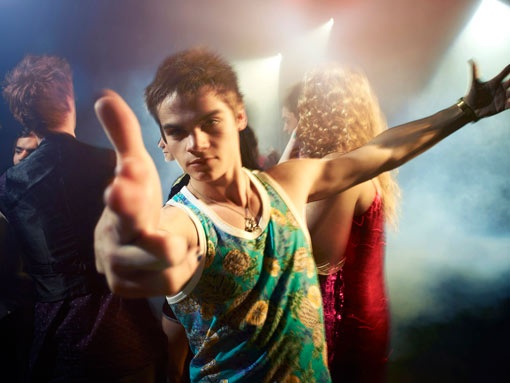
al
This is what the actor who play Alex says about Alex:
“He sleeps around a lot. Alex doesn’t have long relationships with guys. In episode three he has sex with guys just to relieve tension… He likes the adrenaline rush. He knows what he wants and exactly what he’s doing it… Alex IS a caring person. Although he shags these guys and doesn’t really care about them… he cares about his friends and the people in his life.”
Anyhow, I’ve said actually semi-genius things about Skins in the past, but today is not one of those days. Today I am a vessel of information about Skins grasping desperately to my most recent memory of the English language. Let me cut to this chase:
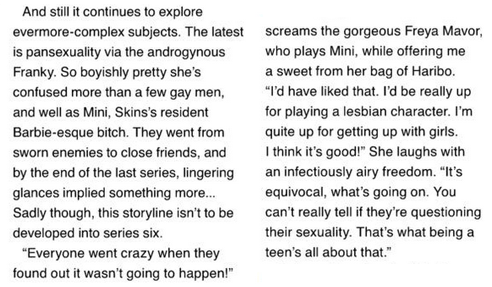
So don’t look at this and get any ideas:

But there’s still lots of other neat things to look forward to. Sometimes I wanna get all like ARGHHH WHERE’S THE LEZBIANS but at the same time, that’s because I spend truly unhealthy amounts of time analyzing pop culture from a queer/feminist perspective, so it’s like a knee-jerk reaction. I like this show, I’ll try and trust that they’re telling the story they need to tell, regardless of if that story isn’t also my own, or yours.
Actually Skins is rare amongst my favorite shows as being a show which played out an entire lesbian storyline between two main characters. FYI, my other favorite shows are: Six Feet Under, The West Wing, Friday Night Lights, The Office, The Wire and My So-Called Life.)
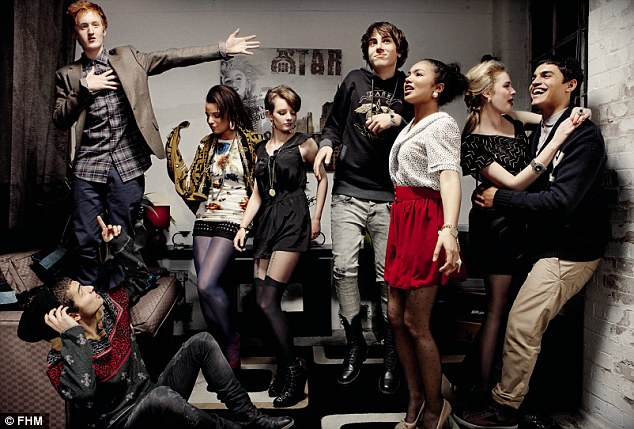
Check out this interview:
Any new issues covered?
Alex: Tons! The big theme is how girls are treated by guys in society.
Sam: There will be a lot more sex!
Sean: A lot of violence, a lot more drug-filled issues, and sexuality preference. A lot of adult themes that start to affect us.
Do you worry how young viewers perceive you and the storylines?
Dakota: I do. In the next series there are seven sex scenes, five of which I’ve been a part of. I don’t want my younger sister to watch it, let alone people I don’t know.
Laya: I think a lot of kids are going to be doing it anyway. I like that people can relate to the show. I remember relating to thes how when I was watching the first series. That’s why we’re doing this; why I’m doing it.
Also, Dakota says this, which is funny, because I said almost literally the exact same thing last year. Maybe everyone says it?
Dakota: The difference with Skins is you see the shit side. When you see the characters taking drugs, we don’t then look perfect the next day; we have hangovers and feel like crap. It’s not like some kind of fantasy; it’s showing what it is like for people who live that kind of lifestyle.
Also, this is funny:
Any off-camera romances?
Laya: Be nice to think, yeah, but no! The boys are like annoying brothers you want to get away from half the time. They come to us for girl advice, to them we’re chicks with a dick.
Jess: Sean thinks we’re the most disgusting chicks ever.
Laya: Sean’s the type of guy who likes his girls pristine and well-kept.
Freya: And obviously he never dates girls who get their periods!
Also I don’t know how I feel about this (really, I don’t, I’m not just being Miley):

What do y’all think? Are you excited for Skins Season Six? The thing about Skins is that it surprises me a lot, and thinks of things I’d never think of.
Top 10 Fictional Lesbian, Bisexual and Otherwise-Inclined Ladies of 2011
This was a big year for imaginary lesbians! I’m working on a piece about my Lesbian Executive Opinion of 2011’s Lesbians on Television and I’m sure you’re on the edge of your seat waiting for that to debut.
But in the meantime, I constructed this list! So what I did was I asked you for your favorites (on tumblr/twitter), tallied those, mixed in a generous scoop of my own personal opinion (which is that if you’d already seen Pariah, you would’ve voted for Alike), added two cups of sugar and a teaspoon of vanilla and a pound of cream of tartar, and this is what came out:
[Sidenote – Per usual, if you want to share your feelings of utter outrage and disappointment in us for not selecting or accurately ranking your personal favorite for this list, do so with as much punctuation and hyperbole as possible]
10. Brittany S. Pierce, Glee
“Honey, if anyone were to ever make fun of you, you would either kick their ass or slash them with your vicious, vicious words.”
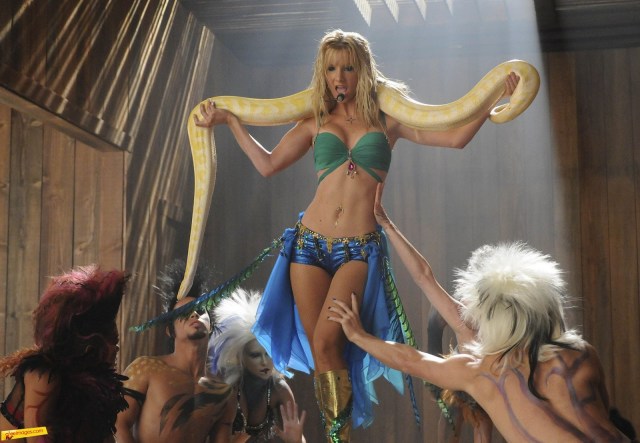
+
9. Kalinda Sharma, The Good Wife
“You and I have nothing in common. ‘Cause you and I are from different worlds. And it’s not just Mars and Venus. It’s spaghetti and hydrogen. We’re just different categories. I’m knowable, but just not to you.”
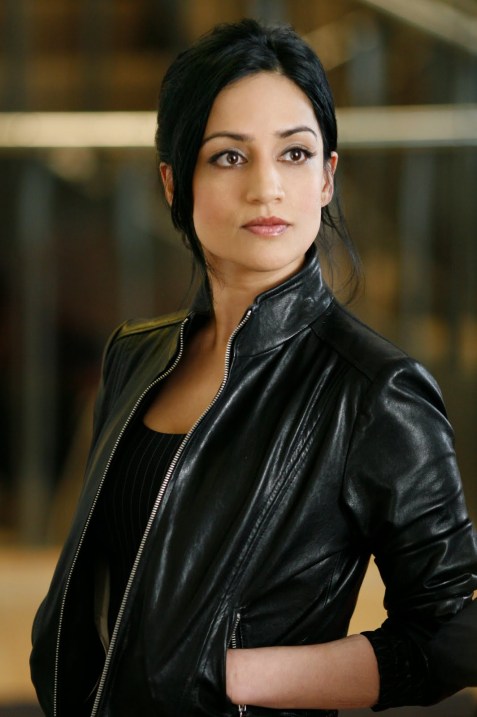
+
8. Fiona, Degrassi: The Next Generation
“Don’t worry, I’ll get over you, you’re not that awesome.”
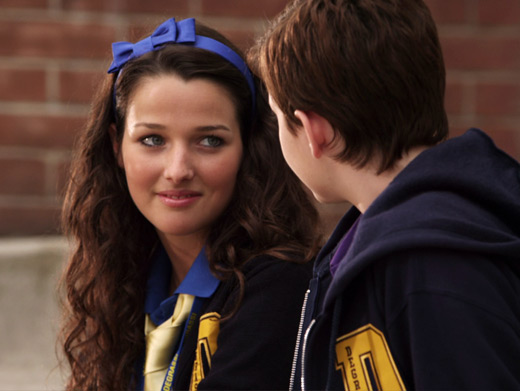
+
7. Kate Kane/Batwoman, Batwoman #4
“I’m a goddamn soldier.”
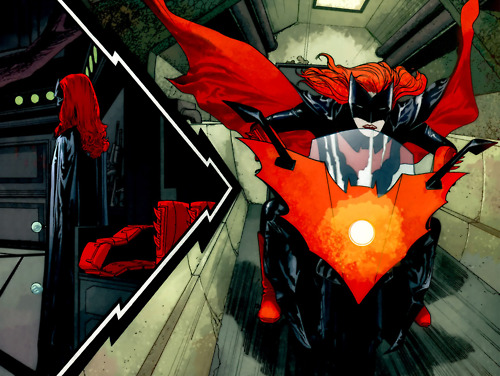 +
+
+
5. Franky Fitzgerald, Skins
“I tried today and now I feel kind of less like me, and I’m not exactly over the moon about being me in the first place, but now I think I kinda like it less when I’m trying NOT to be me. Because I just wanna like, be.”

+
4. Emily Fields, Pretty Little Liars
“We swim on the same team.”

+
3. Lisbeth Salander, The Girl With the Dragon Tattoo
“Everyone has secrets.”
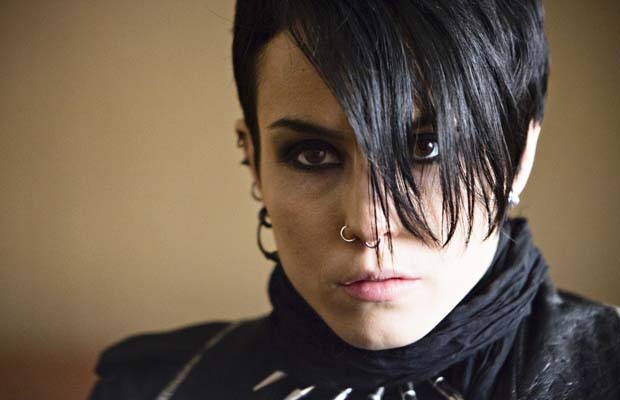
+
2. Alike, Pariah: The Movie
“Breaking is opening, and I am broken. I am open.”
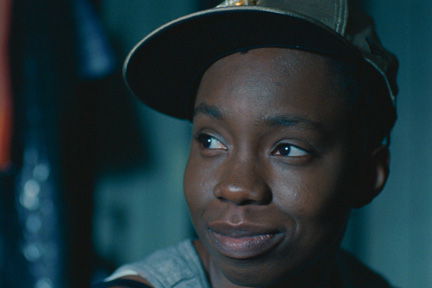
+
1. Santana Lopez, Glee
“The only straight I am is straight-up bitch.”
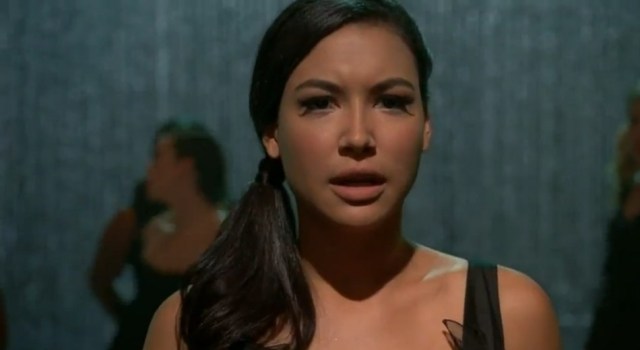
Despite Ryan Murphy’s best efforts, nothing can kill your burning hot love for Santana Fucking Lopez. Let’s do that in video:
The Winter of Our Lesbian Content: This is a Glee, Skins & Pretty Little Liars Megapost
Remember that beautiful week — when was it? It seems like so long ago. Was it only two weeks ago? Were we ever so young? Were we ever so teary-eyed and wet-pantsed and surprised and shocked and touched and awed and optimistic about everything in the whole wide world?
Reader: we were. And we had reason to be. You couldn’t fly a crop-duster through a Burbank backlot without hitting the head of a lesbian/queer/bif-ckingcurious storyline.
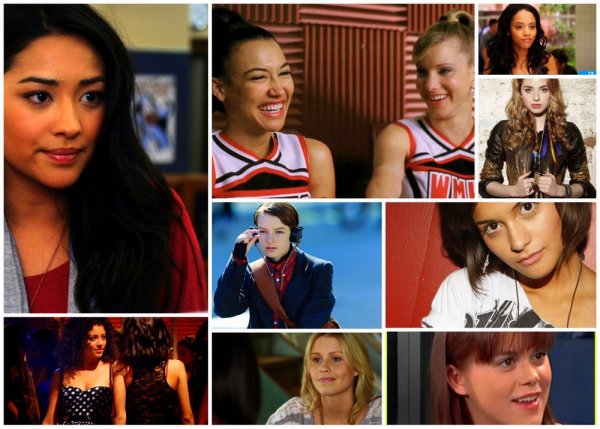
Now that your triweekly serving of Lez is officially over (for the time being) and we still don’t know who A. is or which conventionally attractive lesbian Emily will take to next year’s Winterdeath Ball or whatever it was, it’s time to look back on the season that was. It’s time to dwell excessively upon the clear-pored Sapphic or semi-Sapphic humans who graced the screen of my laptop this past winter (because I don’t have a teevee, but you probably do, so this might just feel totally different for you than it does for me).
Am I watching “Landslide” again as I type this? Maybe.
This past season has been unquestionably the most lesbionic TV season of all time. This must be how gay men felt for the 356 years Will & Grace was on the air, along with Queer as Folk, Sex and the City, Dawson’s Creek, The Office, Entourage, Noah’s Arc, Degrassi, The Sopranos and Six Feet Under OR MAYBE even how they feel right now with Modern Family, Glee, Nurse Jackie, Shameless, Gossip Girl, 90210, Lost, Weeds, Big Love, Ugly Betty, Brothers & Sisters, Greek, Mad Men, True Blood, The United States of Tara and basically every single show on Logo.
I talked about why we’re getting so much gay TV at the end of my Glee recap and so I’ve only got this to add: This season we were permitted to dream.
This had not been the case before now. Much like the feeling of ordering from Burger Fresh in the early 90s, we don’t expect the people in charge to get everything right. We don’t expect a homoerotic ‘ship to sail or sexual tension to get a follow-up episode or parents to “come around” to their gay kid. We expect at least one dead and one converted lesbian.
But, again like the feeling of ordering from Burger Fresh in the early 90s, we tuned in just the same because TV provides convenient at-home delivery. That’s right, Burger Fresh delivered. In MICHIGAN. So what do you want, a cheeseburger with the-wrong-kind-of-cheese and extra unordered-bacon-even-though-you’re-Jewish delivered to your doorstep? Or do you want to look into your freezer to see what’s worth re-heating from last year? You follow?
This season we felt slightly less like Lesbo Bevis & Butthead or desperate superfans because the little things we picked up on — Mini’s attraction to Franky, Sanatana and Brittany’s chemistry — actually got fleshed out, even just a little.
We’ll be rating these shows on a Lesbo Rating Scale from “Angry Lesbian” to “Happy Lesbian.”

![]()
+
Skins UK (e4)
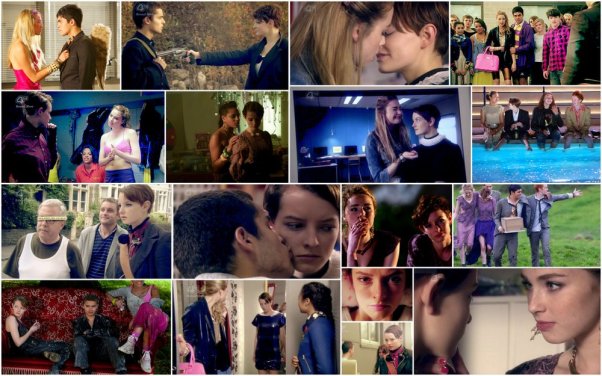
Queers:
Franky – genderqueer and pansexual (relatively confirmed)
Mini – bisexual or a lesbian (suspected)
Dude I Hate Who Coincidentally Ruins Everything:
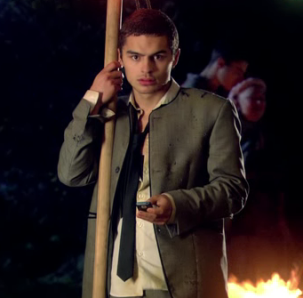 Oh, f- you in the ear Matty, you dark brooding super-complicated emo quasi-rebel, Avril Lavigne is darker than you are in your darkest hour. Courtney Love would smash your face in in a fist-fight and Jordan Catalano would be a better boyfriend. You thrive in the land of vulnerable women because you wear black a lot, which is edgy, and also you’re SO SO loyal to your OH SO COMPLICATED heart and its OH SO COMPLICATED feelings and you think if you curl your lip like that then somehow your reckless disregard for the subjects of your emotional attention will pass as genuine confusion rather than selfish, fickle, and pretentious. UGH UGH UGH.
Oh, f- you in the ear Matty, you dark brooding super-complicated emo quasi-rebel, Avril Lavigne is darker than you are in your darkest hour. Courtney Love would smash your face in in a fist-fight and Jordan Catalano would be a better boyfriend. You thrive in the land of vulnerable women because you wear black a lot, which is edgy, and also you’re SO SO loyal to your OH SO COMPLICATED heart and its OH SO COMPLICATED feelings and you think if you curl your lip like that then somehow your reckless disregard for the subjects of your emotional attention will pass as genuine confusion rather than selfish, fickle, and pretentious. UGH UGH UGH.
I do think it’d be interesting to see our favorite genderqueer pansexual fawn Franky to date a dude so I’m not even mad about the fact that she seemingly ended up with Matty instead of Mini for gender reasons.
Just — Lawd do I hate this character. Everything he did made me groan.
In the End:
In Skins‘ Season Five finale, our suspicions that Mini has a Big Fat Lesbian Crush on Franky are confirmed, mostly because she does that thing that you did to your best friend in high school where you pretend to be Dr. Phil (“you deserve better, don’t go be with that boy”) / Oprah (“You’re my best friend! I protect you from the world!”) to cover up that you’re actually Ellen (“I like girls! Be with me! SURPRISE!”) . But also because Mini stores photos of Franky in her cell-phone spank-bank, tries to kill Matty, and constantly wants to touch/hold Franky. Oh, and Liv calls Mini out for her “girl crush.”
What precisely transpires in the poppyfields of Somewhere in the United Kingdom where Rich and Grace are going to get married is unclear — Franky thought 9/11 was beautiful, Franky just wanted to be normal for once, she takes a lot of drugs, freaks out when Matty tries to have sex with her which might be because she experienced some kind of sexual trauma earlier in life. Franky runs away, there’s a scene in a church basement where Liv starts to kiss Franky’s back to appeal to Matty but it doesn’t, Liv and Matty break up, and then, at an impromptu wedding reception with a Midsummer’s Night Dream theme, Franky arrives, texts with Matty about being a glorious headfuck thing, and then runs into his arms and is held. This could be a friendly hug or a love-forever hug, hopefully not the latter because as aforementioned I find Matty irritating.
Rating:
Skins was, per always, an excellent television program this season, which earns bonus points. Also extra for trotting out TV’s first genderqueer pansexual and for making aforementioned genderqueer pansexual so f-cking cute!

![]()
Pretty Little Liars (ABC Family)
[read all our posts on pretty little liars]
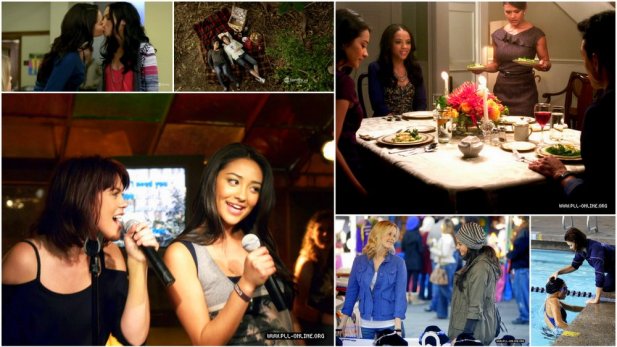
Queers:
Emily – lesbian (confirmed)
Maya – lesbian (confirmed)
Paige – lesbian (confirmed)
Samara – lesbian (confirmed)
Dude I Hate Who Coincidentally Ruins Everything:
A., Ian, Officer Garret, Ezra, Aria’s Dad, Caleb, Lucas, Noel Cahn and basically every male character on this show who took up minutes of the finale that should’ve been spent on Emily making out with girls.
In the End:
The final episode of Pretty Little Liars was super-busy with all of this “plot” and “murder mystery” nonsense and contained only one lesbian reference in the whole entire thing. Where was Paige? What if Paige is A and we didn’t even know about it?! What if Sounder killed Jenny?
Emily’s Mom wants to move to Texas to be with their Dad, but there’s no way they’re taking Shay off the show so let’s not even bother with that besides to say that Hanna teases Emily regarding if Texas “beauty queens” are her type. Which is super-adorbs.
Emily is e-mailing Samara so that love connection is open, Paige is nowhere to be found and Maya is apparently completing her 16th week of the Most Intense Marijuana Treatment Program of all time. When she comes back she’ll probably be allergic to everything.
Ultimately Emily’s storyline was a refreshing departure from expectation. Emily stood up to her Mom (who eventually came around, somewhat), felt liberated after her secret was revealed, and even refused to participate in someone else’s closeted antics.
The last lesbian scenes of the season are expounded upon in our recap of the second-to-last episode of Pretty Little Liars.
Rating:
For TV’s most admirable lesbian character, a “9.”

![]()
Next: Skins US and Glee
Franky Likes People: Skins UK Episode 507 is a Pansexual Ending to a Very Queer Week of TV
On Monday, Paige said “I’m gay” and the whole world changed. On Tuesday, Santana told Brittany she wanted to be with her and said she had all of these feelings she was afraid of.
And last night in the United Kingdom, on the teevee program Skins, Season Five, Episode Seven; Liv, Mini and Grace do a bunch of coke and decide it’s time to ask Franky, our favorite genderqueer fawn, about her sexuality.
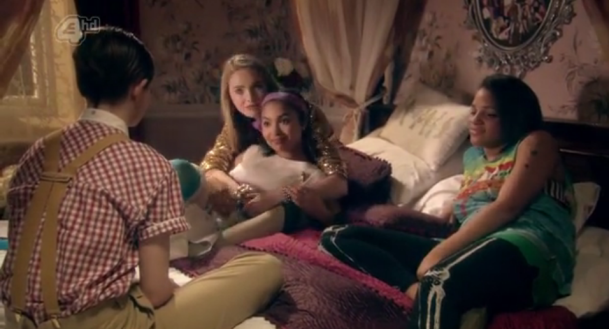
Mini: What’s Franky’s story then?
Liv: Franky is Viola, the girl dressed as a boy who can’t get what she wants, whatever that is.
Franky: I know what I want.
Liv: And what’s that?
Franky: What’s what?
Mini: Well uh, Franky, you haven’t really told us whether you’re a — you know — or a —
Franky: A what or a what?
Liv: A LESBIAN.
Grace: Liv that’s so —
Franky: — no, it’s ok, I don’t mind. And the answer is…. no. I’m not anything.
Mini: So you’re bisexual?
Franky: No, I’m — into people.
!!!!!!!!!!!!!!!!!!!!!!!!!!!!!!!!!!!!!!!!!!!!!!!!!!!!!!!!!!!!!!!!!
Liv: Who are you into at the moment?
Part of me wants to smack Liv in the face and the other part of me notices that they’re still just doing drugs and dancing, and that Liv is notably more concerned about Franky edging in on her boyfriend than she was about Franky being a lezzer, despite the locker room taunts that re-scarred all of us for life in the Season opener.
The music playing in the next scene — at a club where the boy Franky might like (Matty) leaves Liv (his girlfriend) to rescue Franky from a weird dude that’s hitting on her — is Jessie J’s “Do it Like a Dude.” It’s like everything is meta and a recap of some other recap.
Then! THEN! At play practice the next day, Grace, for no other reason than — I can only deduct — to specifically please me, directs Mini to kiss Franky even though Shakespeare didn’t necessarily put that part in the play. This is, keep in mind, after it’s been revealed that Franky likes people, and “people” includes “girls.” Yet there is minimal hesitation.
Franky and Mini kiss. And there’s a linger.

Alo’s eyes get real big and then — then it’s over.
Grace hops along onto being upset about Matty and Liv not wanting to be in the play and Mini wants to know if she’s doing better at her part and then Grace and Rich have a fight. And SCENE.
+
At practice the next day, it’s Matty’s turn to kiss Franky. It’s like The Shooting Tila Tequila Show up in here.
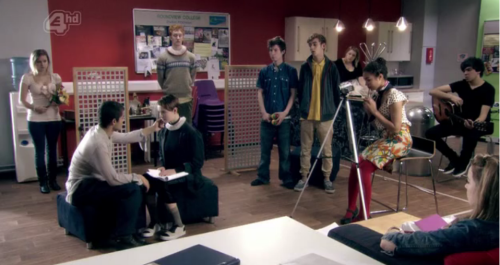
+
And when the time comes, the camera flashes to Mini:
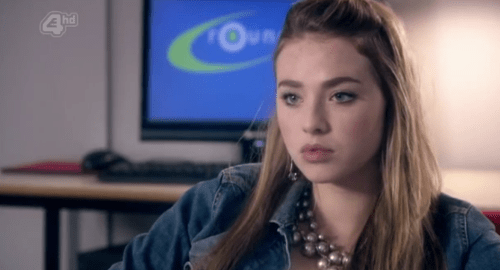
… and back to the kiss. When Matty and his Chord Overstreet lips swing into her neighborhood, Franky turns quickly. Why. Does she have feelings. I learned about feelings earlier this week on Glee.
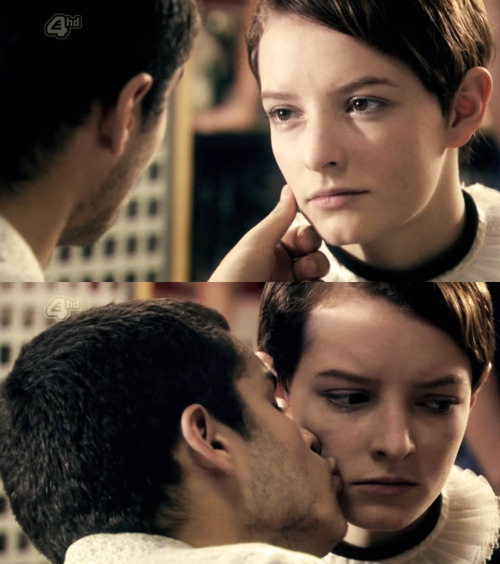
Unfortunately for us, Matty’s a self-obsessed asshole STUPID BOY who doesn’t deserve Franky, so this is really no contest, sexuality aside.
Then, during the play, Liv decides it’s time to kiss Franky because EVERYONE KISS THE GENDERFLUID SEXUALITY FLUID GIRL IT’S FLUID WEEK YOU’RE GAY YOU’RE STRAIGHT GO WITH THE FLOW IT’S SHAKESPEARE MOTHERFUCKERS KISS EVERYONE PANROMANTIC CANNONFUCK HEADTHING
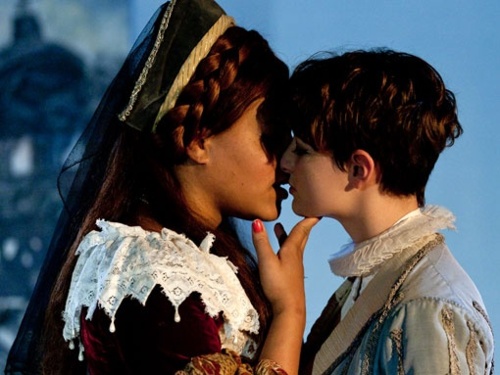
Franky feels so tender but also fierce. I hope that she doesn’t feel like a canvas on which everyone can act out their desires. Being wanted by everyone but also no-one. I hope she doesn’t feel that way. I don’t think it’s true, anyhow. But Mini was the Original Franky Bully. We know what that means.
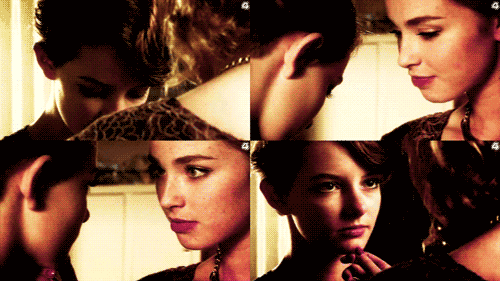
Then Liv yells at Matty because she saw him in the wings watching her kiss Franky like a “sick fuck” and he says “it’s two girls kissing, of course it turned me on!” and then Liv asks Matty if he loves Franky and he says he loves Liv but won’t say he doesn’t love Franky, which makes no sense at all, because Franky and Matty have had like what, one conversation ever, in the field, and I think Franky held a gun to his head and was crying and he had on a trenchcoat and it was like Black Swan meets The Lost Boys meets Salute Your Shorts meets The Wire meets The Catcher in the Rye but who knows maybe they can communicate via cross-room body language like Ursula told Ariel she could do in The Little Mermaid.
Oh so and, here’s what happens next week:
The amazing thing is that Franky is like a secret flirtmaster. That girl can suggestively stare a sexual response out of a tree. For crying out loud those eyes. I guess her and Matty could have staring contests forever and ever, maybe that could be romantic.

Part of what makes Skins feel so authentic (when it succeeds) is, obviously, the one-character episode format. We see them not only in their private lives but we see them literally alone. No other show spends that much time alone with kids in their rooms — the part we don’t even see of our friends’ lives — of anyone’s lives. We see, sometimes excessively, how they feel about sex — Mini trying the positions she sees in magazines to be ready for her first time with Nick, Sid jerking off to shitty magazines or a picture of Michelle or Alo with his multi-screen porn-viewing set-up. We see their crazy families and the things they don’t tell their friends — like there’s so much on both ends when you’re a teenager, so much family to hide from your friends and so much friends to hide from your family and so much heart and sex to hide from everyone.
And then we see them in the context of everyone else’s world, and it’s really hard to dislike a person once you know where they’re coming from. Which is a lot like real life, too, I think. I’m glad they started with Franky. It’s like she’s our little Cub Scout leader for Season Five.
I don’t even know. What’s next. Sex riot, right? Equality?
Genderqueer Outlaw: Meet Franky, Skins Season Five’s Glorious Headf*ck Thing
We weren’t going to write about Skins‘ Season Five because we’d heard that the show was homo-free and we only have room in our budget/calendars to recap programs chock-full of homosexual glory. Skins usually IS that program, and it’s been consistently popular with queers like us for its frank, unsparing and realistic portrayal of the homogay lifestyle. Both UK Generations and the current US incarnation feature at least one gay character — Maxxie, Naomi, Emily, Tea.
This season, eager fans saw the cast photo and assumed one of these humans was a lesbian:
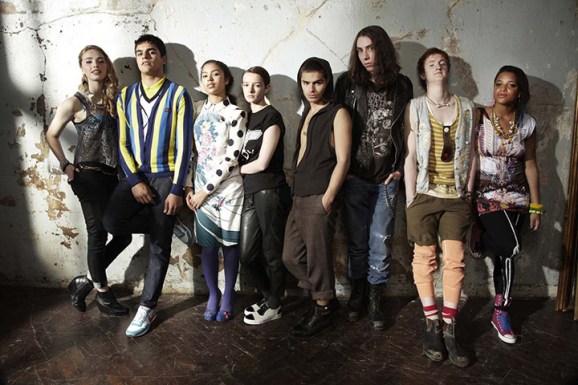 — and were disappointed when Dakota Blue Richards (the girl in the black in the middle, obviously), who plays the not-lesbian, told the press that her character was, you know, not a lesbian.
— and were disappointed when Dakota Blue Richards (the girl in the black in the middle, obviously), who plays the not-lesbian, told the press that her character was, you know, not a lesbian.
However! Show creators did hint that “one of the characters in the next generation is very much in the tradition of Skins portrayal of sexuality, but you won’t quite know what or who she is for quite a while.”
So. Two weeks ago last Monday I accidentally downloaded G3-s1 (Skins UK) instead of s1-e3 (Skins MTV) and accidentally started watching it and before I knew it I was typing stuff on my keyboard, deciding to forego the US Skins recap altogether!
+
Meet Franky
Skins dedicates each episode to one character or two (premieres and finales occasionally are attributed to “everyone”) and Season Five’s premiere episode featured Franky Fitzgerald.
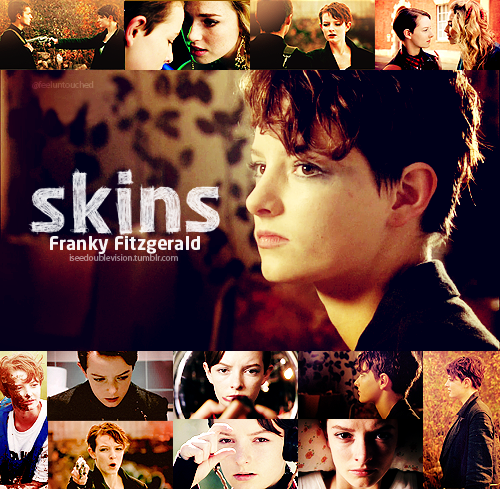
Franky’s profile on the Skins website cites “Joan of Arc” as Franky’s “Religious View” and names The Little Prince and The Clockwork Orange, among others, as her favorite books. Franky sometimes communicates with a tiny wooden doll who stars in videos Franky films in her room. Franky is very precise about things. She’s the adopted daughter of the cherub/cheery Jeff and Geoff, her “Dads” who met in the army and married in camouflage. She has really nice skin.
Oh yeah and also, she’s genderqueer.
Genderqueer: A difficult/contentious term to define, or a catch-all term for gender identities falling outside the gender binary or transcending traditional meanings of “man” and “woman.” Reflective of the understanding that sex and gender are separable aspects of a human person. Many genderqueers do not define their identity by referencing the binary gender system, some consider themselves to be a third gender, others identify as genderless or androgynous or simply transgressive or otherwise misgendered within the dominant binary system.
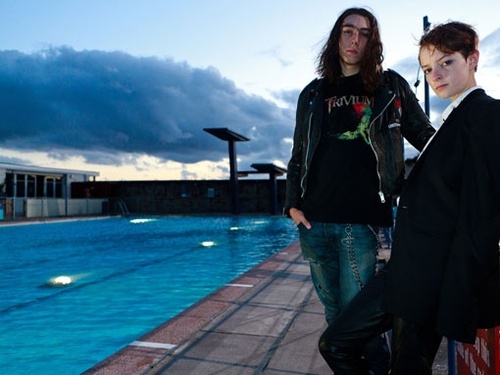
In the weeks leading up to Season Five’s premiere, some readers were harassing Crystal and I about our refusal to recap the show, insisting that Franky’s genderqueerness and homosexual fathers were enough gay to warrant a recap.
“What, she has short hair and wears ties or something but the producers aren’t gutsy enough to make her masculine-of-center AND gay?” I thought, imagining that this alleged genderqueerdom would ring about as true as Ashley’s goth phase on Degrassi.
But I’d forgotten that Skins doesn’t play us like that. More recently, a reader wrote me personally:
Unless I am way off base (I don’t believe I am), this character is genderqueer. Frankie may not understand it yet. I had no clue for 26 years. I appreciate the feelings of emptiness and utter loneliness. I’ve seen those looks on people’s faces for years. I know what it’s like to be called a ‘thing.’ People can’t place you and their confusion turns to anger.
Skins always goes for the jugular, steering its narrative into the deepest cesspools of teenage desire and fear, the murky hideaways where adolescence is at its most wretched and hard-fought.
Skins never aims to glamorize anything or anyone, which is the real reason The Parents Television Council’s warnings fall on deaf ears. Skins characters aren’t the impossibly clear-skinned, perfectly-haired, ingeniously-dressed, stick-thin, perfect-jawed plastics on 90210 — they look more like people we know. (Except Effy. Nobody knows anyone who looks like Effy.)
More importantly, the kids in Skins are usually fucked, alienated and often quite sad, though occasionally gifted with transcendent moments of reckless, often drug/sex-induced happiness.
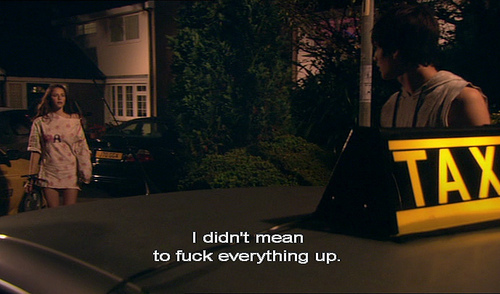
But we don’t want to be the kids on Skins. Why would we pattern our behavior after a group of kids who — in addition to sporting an alarmingly high mortality rate — overdose, go to jail, get beaten up, fail out of school, get sick, get institutionalized, wreck cars, become homeless, get robbed, get hit by cars/paralyzed and repeatedly screw up relationships, friendships and families?
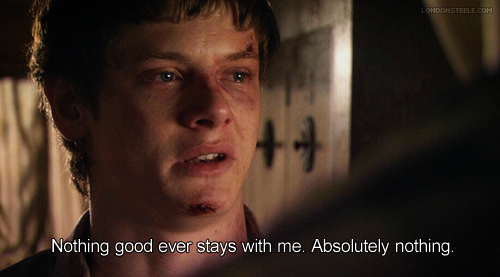
That’s not glamour — that’s hard knocks, and if there’s one thing all the Skins kids have in common it’s this sense that they are HARDENED, that things have not been, in one way or another, handed to them on a silver platter.
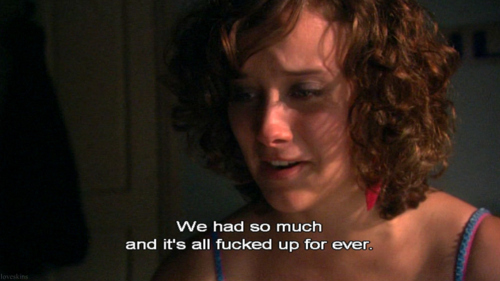
Viewers want to be like the characters on 90210 or Gossip Girl; they want those shimmery, easy lives of effortless beauty and impossible, free-floating wealth where dysfunction is always more foreplay than disaster. Viewers envy Gossip Girls’s consequence-free world of framed college degrees and dark, sexy furniture.
We want to be Kelly Taylor or Blair Waldorf.
But we’re already Emily Fitch.
We’re already Franky Fitzgerald.
It’s just that nobody cared enough to talk about us before now.
+
Episode 1: Franky
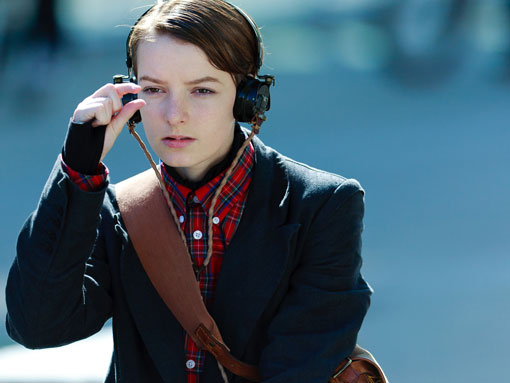
+
The fifth season of Skins begins with that strikingly intimate shot of a kid who’s already awake, but still in bed — you know the one —
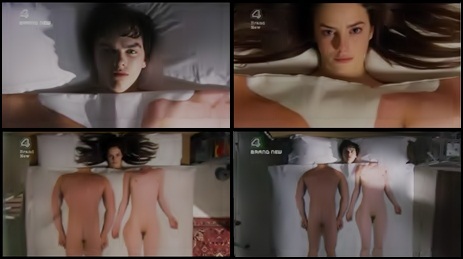
… while the loose janky chords of The Strange Boy’s “Be Brave” start thumping from the corners of Franky’s lucid, determined consciousness as she wakes and begins her morning routine in the room she’s just moved into. Her sartorial game is determinedly dapper, like a Newsie getting dressed for dinner.
Franky is very little, with small bones and dark, nervous eyes, impeccably clear skin and hair slicked back to reveal her adorkably earnest ears and the wide, clear slope of her face. She’s the kind of kid that adults realize is going to be really fucking badass one day and therefore approach as though she’s a tiny, endangered bird in need of temporary supervision. Franky seems to prefer that everyone just speak their minds, rather than keeping all the ugly stuff to themselves.

Franky, face already defensively perturbed, is advised by her Dads to “try and fit in” but it’s clear, from her outfit, that she’s never gonna fit in. She’s heading out into the cruel cruel world where rascally schoolboys call her a lezzer and try to beat her up, which leads to Franky hijacking a motorized wheelchair and ultimately crashing directly into her first day of school, at which point Mini, the Queen Bee, gaffs, “Wow. Has the circus come to town or what?”
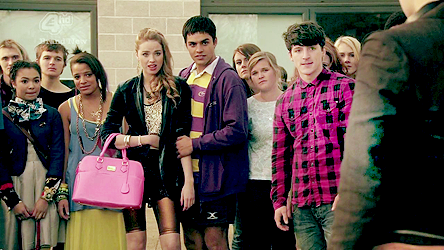
For Franky it kinda has, however — insofar as her first day of school is like a twisted Horror Funhouse of nightmarish Worst First Day Fears, beginning with being thrust immediately into gym class and, sans gym clothes, given dirty white shorts and a Frankie Says Relax t-shirt from the Lost & Found, and proceeding gamely forward into her first awkward locker room scene.
As Franky weaves through the rows of caustic-looking clones in safe, pastel bra-and-panties sets, I felt my own stomach tighten and twist, remembering how terrifying it was to undress in front of other girls when I was 15 or 16 — and how I’d therefore beeline for the handicapped stall when nobody was looking, where I could change without anyone asking why I wore boxer shorts or noticing how severely I did not need a bra. Like I’d accidentally put my clothes on while peeing or something, I couldn’t help it, I was like Superman.
The girls laugh at Franky, especially when they spot what seems to me to be a perfect pair of boyshorts with “Oh my god what the hell are those?” Mini takes it a step further, seizing an opportunity to exercise her social power — “Are you like in fancy dress, or is that like an actual like, choice?”
Here’s the thing about Franky — I don’t think it’s an actual like, choice. This is just who she is.
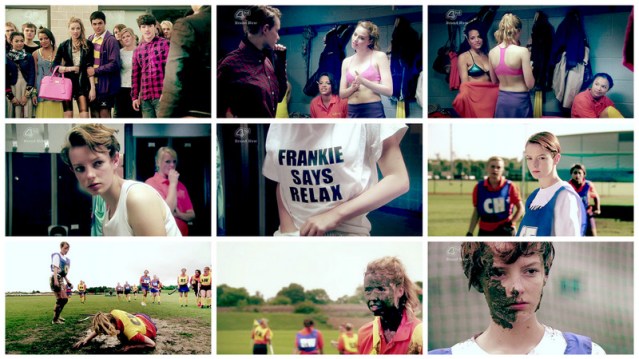
Later in the episode when she attempts wearing makeup and more feminine clothing to please her new friends, she ultimately breaks down during an English presentation — “I tried today and now I feel kind of less like me, and I’m not exactly over the moon about being me in the first place, but now I think I kinda like it less when I’m trying NOT to be me. Because I just wanna like, be.”

+
Franky Meets Other People
The three girls who ‘befriend’ Franky in the first episode are nothing like Franky — or at least it seems that way at first.
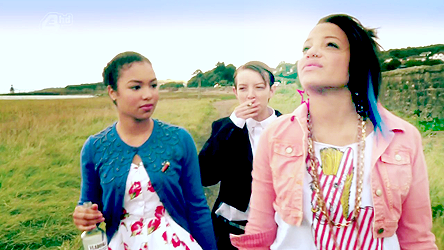
Mini and Liv have that look of suburban high school girls who have been popular for so long that their souls have become just another accessory. Grace tags along airily, saying absent/sweet/silly things while remaining inexorably bound to Mini’s haughty hip; a partnership perhaps maintained by the unstoppable inertia of adolescence. Perhaps Mini feels Grace’s child-like goodness could go either way, perhaps she and Liv feel almost generous for allowing Grace to be a teammate rather than a target.
The girls wear bright, trendy clothing and flash obnoxious gummy smiles. Mini’s jewelry clanks with each of her loose strides and Mini is senselessly, compulsively mean, and threatened – clearly – by Franky. There is no room in Mini’s head for a girl like Franky, so it’s easier to call her a dyke and keep Franky’s stubborn subscription to non-conformity far away from Mini’s world of fast-handed boyfriends and magazines about how teenagers should do their hair.
They are the anti-Franky, but something about her appeals to them. Do they want to change her or look at her? And is it relevant that Franky refuses to engage in being submissive, and that even though she is almost constantly fighting weakness, she meets them eye-to-eye?
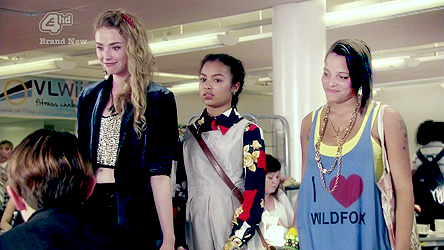
Because when Franky’s gender non-conformity is challenged, Franky, despite emotional tugs from all corners of the room, maintains an inspiring certainty about who she is and what she feels comfortable wearing.
For example…
In the grand tradition of gender transgressors past, Franky’s new friends submit her to The Makeover. You know The Makeover, right? Yes. It begins in a flurry of Shiloh Panic and usually ends with a mall montage and a happy customer.
We’re in the mall dressing room and they’ve already gotten Franky to try eyeliner and lipstick. Mini’s found a dress Grace describes as a “punky butterfly” and they’ve got Franky in it. You can almost feel Franky’s itchy discomfort over being given clothes truly meant for an entirely different human; like when you feel, trying clothes on, that it’d be more efficient just to put them on another person’s skin, but you can’t, and so you squeeze your self-conception into them and feel itchy, even if nothing itches.

This is what Franky must wear, though, says Mini. This is what you need to wear to be in my world, where we carry condoms in our hot pink purses and say shocking mean things to each other for sport and we’re all on drugs so what the fuck ever, you know?
++
The morning after their shopping trip, Franky dips her toes in the water of semi-conformity, applying eye makeup and wearing something a bit more flirty. It’s unclear if she’s compromising with Mini/herself here or if she regularly switches up her style. But the compromise doesn’t fly either: “You can’t come to my soiree like that,” Mini tells her. “It looks like she’s been gang-raped by clowns! What about that gorge dress I got you?” Frankie says it’s not right. Mini wants to know why not.
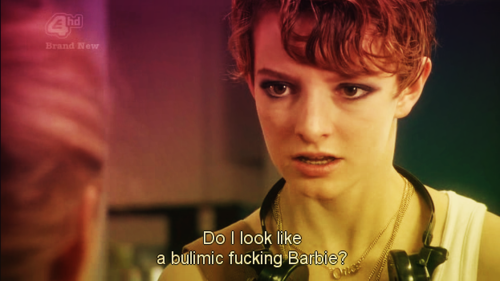
Although Franky’s pain isn’t even slightly obfuscated by her anger, she’s a feisty little firecracker of a girl and that’s something — it’s like confidence without being confident.
We’re meant to understand that Franky’s been bullied a lot at her old school, but Skins skips the “thank god I got a makeover and can be popular now” trope in favor of something slightly more inspiring: despite everything, despite Mini humiliating Franky in front of the school by pulling up photos from from the facebook-esque site started by Franky’s ex-classmates to shit all over her, despite a lifetime of moments like that one, Franky decides, ultimately, to attend the party, and to do so in the clothes that make her feel comfortable.

But first she stops in a field to smoke a joint in a trenchcoat and shoot a pistol into the prairie, where a mysterious boy finds her and tells her she’s beautiful. I don’t know, it’s Skins. He might just be a figment of her imagination, we’re not sure yet.

+
Of course Mini is furious at Franky for arriving, especially dressed like THAT. Mini is the Queen of the party and doesn’t appreciate this deviant crasher. “Look at you just standing there like –” Mini begins, but Franky interrupts:
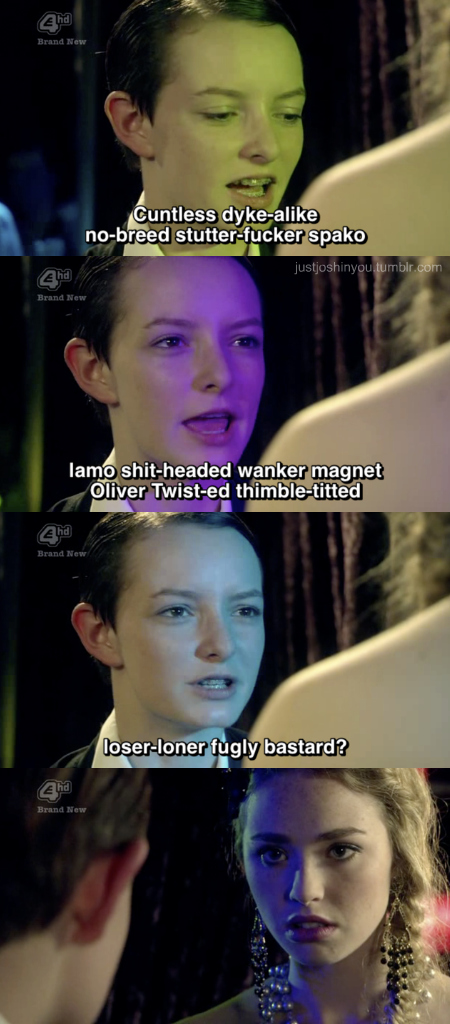
Yeah, nice try. She’s heard all that before. When you’ve got nothing, you’ve got nothing to lose after all, and Mini’s response is fear, mostly. I mean, Mini is vulnerable too, but she covers it up by being mean. Franky is vulnerable but she’s sure-footed in her vulnerability. That’s scary.
Although lesbian slurs are thrust constantly at Franky, she doesn’t confirm or deny anything; when she meets the mystery boy in the field, however, there is a heightened romantic energy not felt in her other scenes. In later episodes, there’s some tension with [SPOILER ALERT] (Mini), but it’s really hard to say and regardless, doesn’t seem pressing thus far.
When Rich and Alo turn to Franky for advice on how to talk to girls (because she’s “like a girl, but not like a girl”) in the second episode, Franky tells them: “I don’t know anything about girls either. I don’t have a Mum or a sister; my experience of girls is mostly being beaten up by them.”
Ultimately one of the most fascinating and progressive aspects of the term “genderqueer” is that it provides a whole swath of previously “undefined” people with a word they can use to describe themselves, which they must do because it makes other people feel safe. Perhaps the labeled person wants also to feel like a Thing, everybody wants to be a Thing.
But at the same time, the word itself evades any definitively consequential definition. It’s kinda rad, really — it’s like a loophole and also a big room for people to run around in. It’s a word for what some people are, but that word offers a lot of room for said people to figure out exactly who they are (or aren’t). I can’t imagine a better thing for a teenager to see than this on their television.
Franky’s episode ends when, after being rejected by Mini; Franky, Rich, Alo and Grace ditch the party in favor of a much better time — some random abandoned swimming pool. It made me think of this song I really like by a band my high school friends were in, called White Flowers.
 |
Flashpapr – white flowers |  |
 |
||
 |
Found at white flowers on KOhit.net |  |
It’s all about being young and in your underpants, I think, going “over the fence of the senior’s complex to their swimming pool, the perfect view of the night shining bright,” which is maybe a place to start when you’re still small and splashing around, trying to find a place to float.
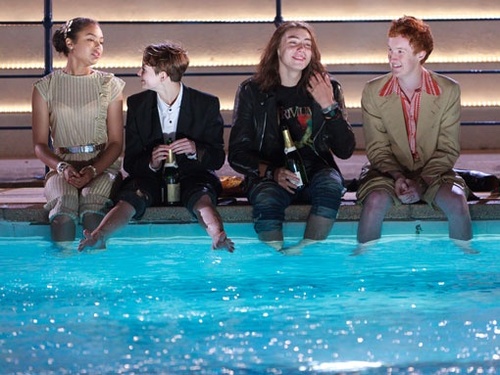
Skins finds new stories to tell, and the fact that they thought of this one before any angry human demanded representation is perhaps one of the most admirable things this show has ever attempted to do. The space has been queered, ladies and genetleman and otherwise-identified human persons; the water’s warm, dive in.


